- Home
- Sam Siciliano
The Web Weaver
The Web Weaver Read online
AVAILABLE NOW FROM TITAN BOOKS
THE FURTHER ADVENTURES OF SHERLOCK HOLMES SERIES:
THE ECTOPLASMIC MAN
Daniel Stashower
THE WAR OF THE WORLDS
Manley Wade Wellman & Wade Wellman
THE SCROLL OF THE DEAD
David Stuart Davies
THE STALWART COMPANIONS
H. Paul Jeffers
THE VEILED DETECTIVE
David Stuart Davies
THE MAN FROM HELL
Barrie Roberts
SÉANCE FOR A VAMPIRE
Fred Saberhagen
THE SEVENTH BULLET
Daniel D. Victor
THE WHITECHAPEL HORRORS
Edward B. Hanna
DR. JEKYLL AND MR. HOLMES
Loren D. Estleman
THE GIANT RAT OF SUMATRA
Richard L. Boyer
THE ANGEL OF THE OPERA
Sam Siciliano
THE PEERLESS PEER
Philip José Farmer
THE STAR OF INDIA
Carole Buggé
THE TITANIC TRAGEDY
William Seil
The
further
adventures of
SHERLOCK
HOLMES
THE WEB WEAVER
SAM SICILIANO
TITAN BOOKS
THE FURTHER ADVENTURES OF SHERLOCK HOLMES
THE WEB WEAVER
Print edition ISBN: 9780857686985
E-book edition ISBN: 9780857686992
Published by
Titan Books
A division of Titan Publishing Group Ltd
144 Southwark St
London
SE1 0UP
First edition: January 2012
10 9 8 7 6 5 4 3 2 1
Names, places and incidents are either products of the author’s imagination or used fictitiously. Any resemblance to actual persons, living or dead (except for satirical purposes), is entirely coincidental.
© 2012 Sam Siciliano
Visit our website: www.titanbooks.com
What did you think of this book? We love to hear from our readers. Please email us at: [email protected], or write to us at the above address. To receive advance information, news, competitions, and exclusive Titan offers online, please register as a member by clicking the ‘sign up’ button on our website: www.titanbooks.com
No part of this publication may be reproduced, stored in a retrieval system, or transmitted, in any form or by any means without the prior written permission of the publisher, nor be otherwise circulated in any form of binding or cover other than that in which it is published and without a similar condition being imposed on the subsequent purchaser.
A CIP catalogue record for this title is available from the British Library.
Printed in the USA.
To my wife, Mary, for many years of love, companionship and support. I can’t imagine that time without you. None of my novels would have been the same, if they even existed—especially this one.
Contents
Preface
One
Two
Three
Four
Five
Six
Seven
Eight
Nine
Ten
Eleven
Twelve
Thirteen
Fourteen
Fifteen
Afterword
Preface
Dear Reader,
As I mentioned in the preface to an earlier book, the death of my cousin Sherlock Holmes released me from a vow of silence; thus I could relate his exploits at the Paris Opera in what I felt was his most bizarre case. As I also noted in my earlier preface, I offered my writings as a corrective to John Watson’s distorted portrayal of Holmes. Watson and I were never on good terms, nor (his writings to the contrary) was he Holmes’ eternal bosom companion.
I was involved in other interesting adventures with Holmes, but the case I am about to present offers unique insight into my cousin’s character. Because of its intimate and personal nature, I debated long and hard before taking pen to paper. I am not one who believes celebrated people, dead or alive, lose all right to privacy.
However, my wife Michelle at last persuaded me that the story should be told and that we two were the only persons who might tell it fairly and completely. She could not bear that my cousin should be remembered as an unflinching misogynist—and a cold-blooded one at that. The passionate side of his nature was not restricted to music, and a certain woman was much more important to him than any other. Watson to the contrary, Irene Adler was most definitely not “the woman.”
My wife Michelle and I have both passed our eightieth year, and we decided it would be tempting the Reaper to delay any longer. Although the events described herein occurred nearly fifty years ago, they are still fresh in our minds. Both Michelle and I also kept extensive journals. Since our involvement was often separate—I frequently accompanied Holmes, while Michelle was with the woman in question—we decided to divide our tale. Thus you will find that Michelle narrates certain chapters, while I narrate others.
There is one other matter I must briefly touch on. Nothing like the story you are about to read could ever have appeared in print during the time it took place, early in the 1890s. It would have been considered outrageous and immoral. Although the queen’s long reign was nearing its end, “Victorianism” was in full flower. If writers dealt with prostitution, adultery, or divorce, it was only in the most hackneyed and conventional terms. All too many people—including many physicians—took their cue from the celebrated Dr. Acton and honestly thought that women had no sexual feelings, men were by nature lustful brutes, and the marriage act was a necessary evil for the propagation of the species.
Although the current generation always seems to think it has invented sin (especially sins of a sexual nature), one need only visit the cinema with its scantily clad females and suggestive dialogue to see that something has changed in the last fifty years. As an old man, I should bemoan the passing of the good old days and the good old morality, but I do not. Michelle and I saw, first-hand, too much misery caused by sheer ignorance of basic human biology and emotions.
Certainly by modern standards, there is nothing salacious or indecent in my narrative. It is, in one sense, a rather simple story with tragic overtones. God is my witness that I would never deliberately discredit my cousin or injure his reputation. If anything, my narrative should show, once and for all, that Sherlock Holmes was not a mere automaton or collection of eccentricities, but a man whose heart was, in every way, the equal of his brain.
Dr. Henry Vernier
London, 1940
One
On a cool rainy afternoon in early October I decided to pay a visit to my cousin Sherlock Holmes. Having just visited an ailing patient who lived near 221B Baker Street, I was dressed most formally in a black frock coat and top hat, my medical bag held in my left hand, my umbrella in my right hand.
The long-suffering Mrs. Hudson smiled when she saw me. “Good day, Dr. Vernier. Please come in. Mr. Holmes has never been... tidy, but brace yourself.”
The thick, sweet odor of pipe tobacco filled the room, and the disorder was monumental, even worse than usual. Some problem must be under consideration. Stacks of newspapers and books covered nearly every surface, volumes large and small. Holmes himself sat on the sofa, pipe in hand, his gray eyes frowning down at the massive tome upon his lap. He wore his favorite dressing gown, an ancient one of faded purple wool.
“One moment only, Henry, and then I shall attend you.”
I nodded, then gave Mrs. Hudson a sympathetic smile as she took my hat and coat. A coal fire was going, and I st
retched out my hands to warm them. I glanced at Holmes’ desk, stepped closer, and noticed that the newspaper was a notorious scandal sheet.
My eyes caught the merest suggestion of movement. Oddly enough, one end of the desk had been left clear, and a fly was buzzing faintly and trying to move across a triangular-shaped, opaque surface, which I soon discovered was a web. A spider appeared and ran down from the corner of the web and seized the fly, which buzzed more loudly and tried, in vain, to escape.
“Good Lord,” I murmured, taking a step back. I did not much care for insects and spiders. I wondered if it would be permissible to roll up one of the newspapers... “Sherlock, Mrs. Hudson has been remiss in her duties—there is a filthy spider on your desk.”
“Do not disturb her.”
“Mrs. Hudson?”
“No. The spider.”
“The spider? But surely...?”
Holmes slammed his book shut loudly. “Very well, Henry. You have my attention.” He stood and walked over to the desk. He seemed paler and thinner than the last time I had seen him. He withdrew a magnifying class from a niche in the desk and bent to peer at the spider. The frantic buzzing of the fly had begun to subside. “She has him nearly bound. Would you care to have a look?”
“No, thank you. I do not much care for spiders.”
“That is unfortunate. They are remarkable creatures.”
“Perhaps. How long has that one been there?”
Holmes drew in on his pipe and rubbed thoughtfully at his chin with the fingertips of his left hand. “Almost a year.”
“Almost a year?”
A smile pulled at his lips. “You seem to doubt your hearing today. It has been a battle royal. Mrs. Hudson has most definitely not been remiss in her duties. She takes this innocent creature here to be the very symbol of the encroaching filth that God put women such as her on this earth to destroy. Our war, too, has lasted over a year. At first she asked me daily if she could not remove the vermin. Despite my instructions, I think she would have killed the spider long ago had I not threatened to seek other lodgings should she do so. I have told her that other spiders are fair game to her broom or dust mop, all save this one.” My perplexed expression made him laugh. “Come, Henry—have you never had a pet?”
“You know we have Victoria.” Victoria was our cat whom Michelle had most irreverently named.
“Then consider this small carnivore my pet. She is a prime specimen of tegenaria civilis, the common British house spider. She is a lady of great courage and determination, as well she must be to survive the undeserved hatred and abomination of the female of our species.”
“Not only the female!”
“As a physician, you should know that the fly is the great enemy of mankind. The fly is the carrier of infection and disease. The spider is our ally. Do have a look at her.”
Unenthusiastically I took the glass. The spider seemed immense, small hairs coverings its legs, spots covering its back. The fly was half smothered in silk, yet it still shook periodically, and I heard a faint buzz.
“Disgusting.” I set down the glass and turned away from the desk, hoping to steer us away from the spider.
Holmes smiled briefly. “I had no idea you were so fond of flies.”
“I am not fond of flies!”
This made him laugh. “Come, let us sit down. You need not watch her devour her prey.” I sat in one of the armchairs near the fire, while Holmes took the other and crossed his legs. “You look the very model of a prosperous physician today, Henry. And how is Michelle?”
“Now there you have the prosperous physician. Luckily avarice is stronger in my disposition than male pride. Her practice is thriving, and she makes far more money than I. Several women of the upper class have discovered that they prefer a woman physician, and she has become quite the rage. She will soon have to begin turning away patients. Only last week she snared Lady Connely. Old Thurswell must be furious. He has preached against women doctors for years. To have his wealthiest patient snatched away by a female half his age... It is rather delightful.”
Holmes laughed. “Come, Henry, you make her sound like my friend tegenaria civilis with her fly. I am glad to hear you are both prospering. What of her work with the less fortunate?”
“She would turn away Lady Connely first. She has made a vow that for each rich patient she takes on, she will have a poor one in the balance. We both still work at the clinic weekly.”
“I wish all physicians shared your charitable sentiments.”
“And you, Sherlock—what is all this? It does seem a bit... messier than...” A gesture with my hand took in the books and papers scattered about.
“I have been working on a puzzle, a very curious one.” He sat back in the chair and exhaled a cloud of smoke. “Tell me, Henry, did you ever read Watson’s story, The Final Problem?”
“Given your attitude toward his stories, I have always scrupulously avoided them. Is that not the one, however, where you die at the end?”
Holmes was amused. “Yes. At the Reichenbach Falls. And have you heard of Moriarty, Professor Moriarty?”
“No, I have not.”
“He is my arch-enemy, the Napoleon of crime, Watson has me calling him.”
“Does this Moriarty have any basis in reality?”
Holmes set down his pipe and leaned forward, his eyes suddenly bright. “Ah, that is the question—that is the puzzle. Even a week or two ago I would have told you he was a complete fiction. I would have been adamant. Watson’s stories to the contrary, most crimes and criminals are stupid. Only very rarely does a man of first-rate intelligence turn to crime. Most often we have only drunken ruffians or groups of them who bash in someone’s head, snatch a purse, or rob a bank. The true criminal genius is rare, and the notion of an evil mastermind behind the crime in London is a silly one. Watson has me comparing Moriarty to a huge spider at the center of an evil web sensing every motion, every criminal movement, in this great metropolis. Of course, I would never have come up with such an obviously preposterous metaphor.”
“Why preposterous?”
Holmes shook his head. “You know nothing about spiders either. Only a female spider can spin a web; only she sits waiting for her prey—and not necessarily at the center. If Moriarty were a woman, the metaphor might have made sense, but for a man, it is a foolish one.”
“Perhaps poetic license...”
“I do not take poetic license with the natural world! If Watson wished to make such an inane metaphor, he should have had it coming from his own mouth.” His face had grown quite red. “Pardon me. My irritation with Watson is only too ready to come to the surface. People are always comparing men to savage creatures such as wolves or spiders, but in reality, man is the only animal capable of true evil. There is no malice in the wolf or spider. I watched my spider devour her mate.”
“What?”
“Yes, she is one of the varieties which frequently consumes the male. The male is much smaller than the female. The female tegenaria will devour other spiders of either sex or even her own children after a certain age. It is curious how the roles of the sexes are reversed with spiders and humans. But I digress. I was telling you about Moriarty and the foolishness of the notion of a mastermind behind much of the crime in London.”
“Yes.”
“Unfortunately, I am no longer convinced it is so foolish an idea.”
His smile vanished, and as I stared into his gray eyes, I felt a kind of chill about the heart. “Good Lord,” I whispered.
“I am not certain, Henry. Perhaps I am wrong—I hope I am wrong.” He tried to draw on his pipe, but it had gone out. “Blast it.” He set down the pipe, stood, and walked to the large bow window overlooking Baker Street. “The past several months I have had a growing sense of... uneasiness. I thought at first it was only nerves, but now I think I had begun to sense a pattern, a shape—a web, if you will.” He glanced over at his desk. “Forgive me, tegenaria. Something is happening, I believe, but still it elu
des me. It began only as an intuition, but I have been pondering the problem, reading over the papers for the past several months, checking certain leads, certain odd crimes. There may indeed be a Moriarty. It is ironic.” He laughed.
“What is?”
“If it were not for Watson’s preposterous creation, I might never have hit upon the idea. Two weeks ago I asked myself, what if there were a Moriarty? Only then did I begin to sense the pattern. So far I have no idea what kind of person he may be. If this pattern is real, then a major intellect, a truly imposing mind, is behind it. The design is intricate and very subtle. He is the opponent for whom I have always longed.”
I frowned. “How could you long for such a monster?”
“Have you never wanted to slay a dragon?”
“No, I can’t say that I have.”
Holmes leaned upon the windowsill, staring down at the street below. “Now what have we here? A visitor, if I am not mistaken. He would have given the cabby’s poor horse a workout. A little under eighteen stone, I would say. His clothes proclaim him a gentleman, but he has the physique of a boxer or stevedore. Ah, yes! He is at the door. I am tired of musing over insubstantial cobwebs, and it has been frightfully dull of late. Perhaps he has an interesting case for me.”
“I suppose I had better be going.”
“Not at all, Henry. You can play the part of Watson. Most of my clients expect to find him at my side. Besides, it is too early for supper. From what you told me of Michelle, she is probably engaged for the rest of the afternoon.”
“Yes, it is her day at the clinic. Very well, I shall stay. Medicine has also been rather dull of late. Let us hope your visitor has some interesting tale to relate.”
Holmes took off his dressing gown while he walked to his bedroom, and he returned wearing a frock coat, just as Mrs. Hudson appeared at the door: “Mr. Holmes, there is...”
“Yes, Mrs. Hudson, I know. You may send in Tiny.”
She rolled her brilliant blue eyes and withdrew.

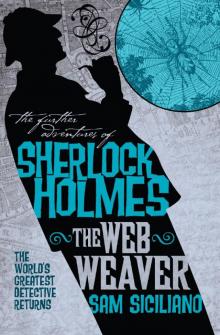 The Web Weaver
The Web Weaver The Further Adventures of Sherlock Holmes--The Devil and the Four
The Further Adventures of Sherlock Holmes--The Devil and the Four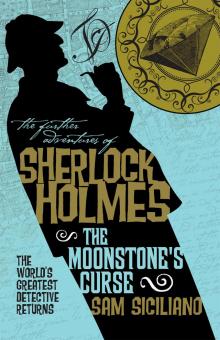 The Moonstone's Curse
The Moonstone's Curse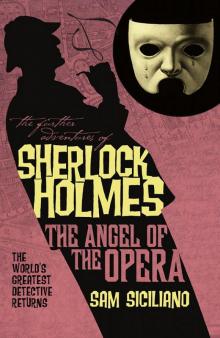 The Angel of the Opera
The Angel of the Opera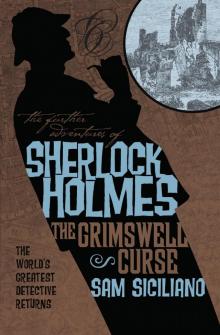 The Grimswell Curse
The Grimswell Curse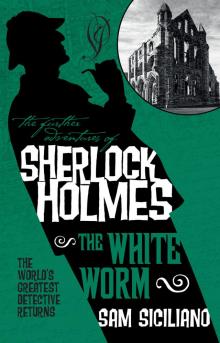 The White Worm
The White Worm